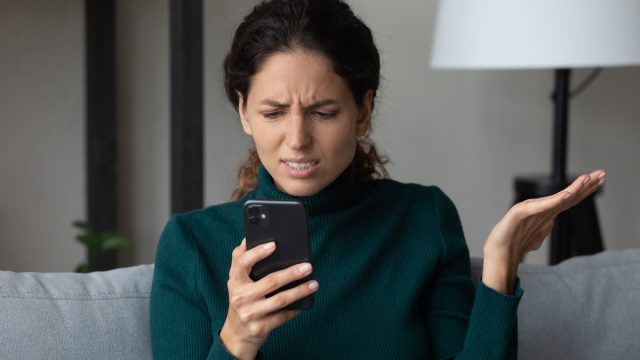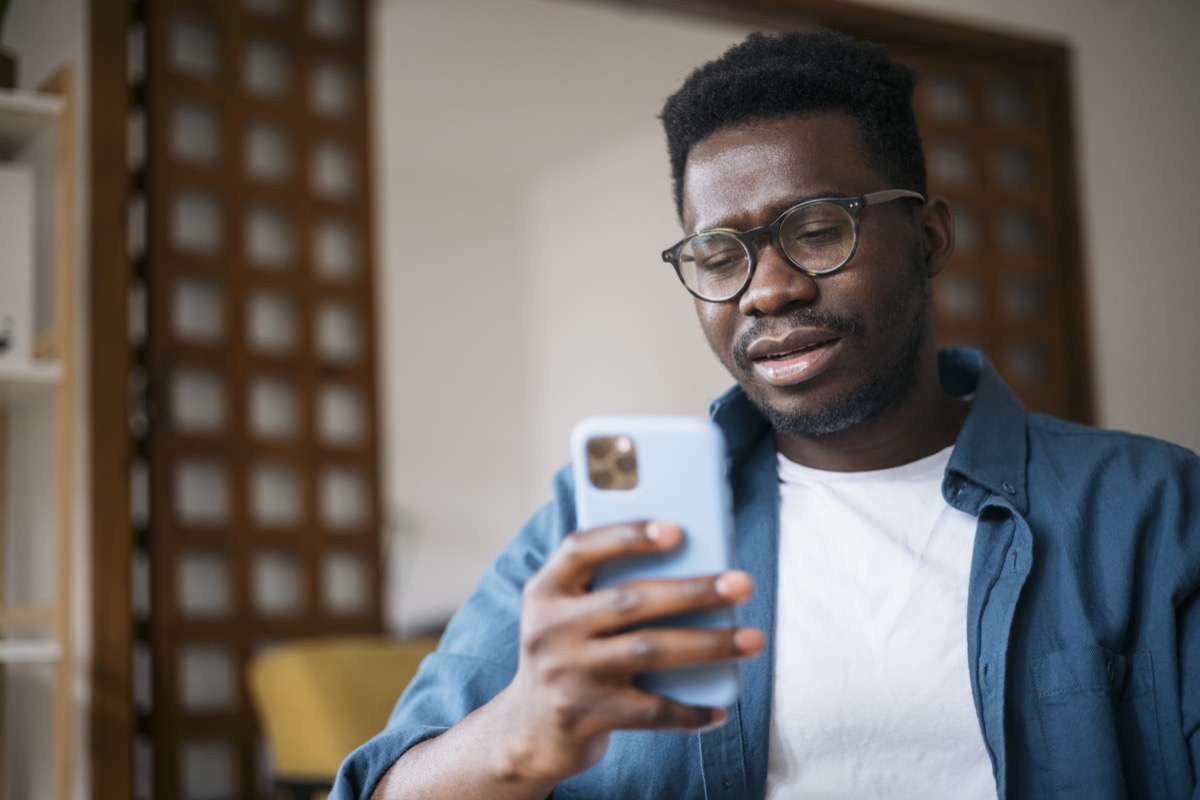6 "Polite" Texts You're Sending That Are Actually Offensive
These common texts send the wrong message.

Text messages are quick and convenient, allowing us to stay in near-constant contact throughout the day. However, research shows that by doing so, we're often missing out on the non-verbal cues that help us truly understand one another. "Texts, like emails, do not come with the user's tone, so it is up to the reader to apply one," explains Jules Hirst, founder of Etiquette Consulting. "Many times the tone applied can result in your informal text being construed as rude or aggressive."
In fact, Albert Mehrabian, PhD, a professor at UCLA widely cited for his communication theories, determined that roughly 58 percent of communication is conveyed through body language, 35 percent through other cues such as tone, pitch, and emphasis, and just seven percent through the actual words spoken. So, it's easy to see how you might end up causing offense or confusion when those non-verbal cues are absent.
Wondering which of your texts may be ruffling feathers without you realizing it? Read on to find out which six texts seem "polite" enough, but are actually offensive.
RELATED: 6 "Polite" Things You're Doing That Are Actually Rude, Etiquette Experts Say.
1
"K." or "Fine."

According to Jodi RR Smith, founder of Mannersmith Etiquette Consulting, text messages are best used for simple, logistical exchanges. "Because texting is asynchronous and lacking in tone, it is ideal to exchange objective details," she says. Some examples include letting someone know you've arrived to meet them or nailing down the details of future plans.
However, occasionally, these short, seemingly innocuous notes can give off a passive-aggressive tone—even when the message conveys agreement.
"Although text is supposed to be a quick, informal message, single-letter answers are a bit too quick and informal," says Hirst. "This may work for one of your buddies but you shouldn't use it for business, especially with your boss or a client. Write out your response, such as 'Okay, thanks,' or 'That works for me.'"
RELATED: 5 Red Flags About the Emojis Your Partner Is Texting, According to Therapists.
2
"Not sure if you saw my last message…"

If someone has left your text on "read," you may think you're giving them an out by sending a message like this. However, unless this is a chronic problem, Hirst says it's rude to draw attention to the oversight.
"Texting can be rapid-fire. Sometimes messages get missed," she explains. "Asking if they saw your last message is pushy and rude. Allow the person some time to see your message and respond."
RELATED: 10 "Polite" Compliments You're Giving That Are Actually Offensive.
3
"Can I ask you a question?"

Another thing to nix from your communication style is unnecessary build-up to your statement or question. "If you have a question, ask it. You already have the person's number—it is rude to drag it out," Hirst tells Best Life. It's also an empty gesture—in most cases, the person on the receiving end will feel uncomfortable saying "no."
That said, even when you get straight to the heart of the matter, hedging your language can help temper the tone of your text, says Laura Windsor, founder of Laura Windsor Etiquette & Protocol Academy. "Add an explanation, add more context, use softeners such as 'kind of,' 'sort of,' or 'a little,'" she advises.
RELATED: 7 Body Language Signs That Mean Someone Is Lying, According to Therapists and Lawyers.
4
"Hey. What's up?"

To you, this text may feel like an innocent way to check in on a friend, but because the message lacks any real content, it puts the onus on the other party to begin the conversation. This may be perceived as rude or annoying.
Sometimes the medium itself encourages such lazy communication, which is why Smith suggests branching out. "Texting is not our only option and it is not always our best option—we have so many ways to connect," she says. Try meeting face to face, writing letters or cards, sitting down to write a fuller email, or making time for a video call instead.
RELATED: 7 Polite Ways to Deflect Rude Questions, Etiquette Experts Say.
5
"Can we talk?"

Some conversations are simply not meant for texting. In particular, you should always talk in person or over the phone if you suspect you might elicit an emotional response from the other person.
"Do not hide behind text when you should really be having a real conversation," says Smith. "These conversations include breaking up with a steady significant other, providing critical feedback, or any sort of creative brainstorming."
RELATED: 8 Times You Need to Stop Apologizing, Etiquette Experts Say.
6
Messages that lack a defined beginning or end.

There are many ways to convey your enthusiasm via text, including thoughtful punctuation and emojis. However, Windsor says you should also remember to begin and end conversations intentionally, to demonstrate that someone has your full attention while you're in communication.
"Whatever the message, if you do not use common courtesy—a greeting to start the message and a thank you or another courtesy when you have finished, the message you send will appear rude (just like face-to-face interactions)," she advises.
For more etiquette tips sent directly to your inbox, sign up for our daily newsletter.





















